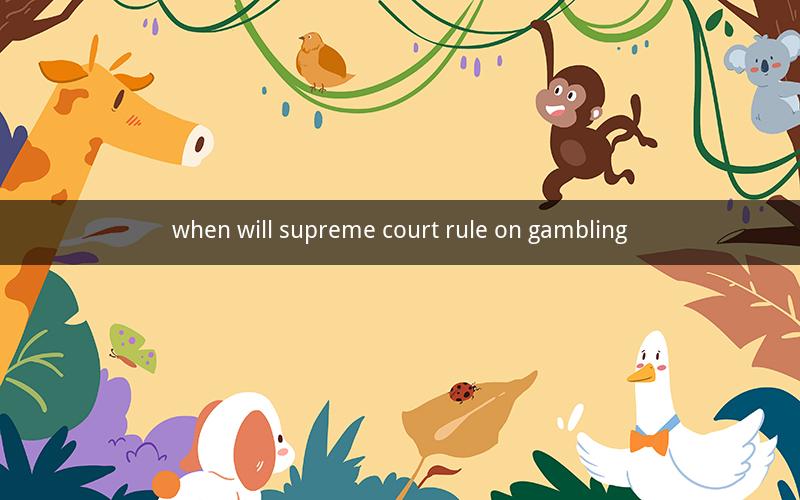
Table of Contents
1. Introduction
2. Background on the Supreme Court and its Role
3. Current Gambling Landscape in the United States
4. The Specific Case: Professional and Amateur Sports Protection Act (PASPA)
5. Implications of the Supreme Court's Decision
6. The Legal Arguments Surrounding the Case
7. Potential Outcomes of the Supreme Court's Ruling
8. Impact on Various Stakeholders
9. Conclusion
10. Frequently Asked Questions
1. Introduction
The Supreme Court of the United States holds a significant role in shaping the legal landscape of the nation. With the recent developments in the gambling industry, the Supreme Court's decision on the issue of gambling is eagerly awaited. This article aims to provide an overview of the current situation, the specific case at hand, and the potential implications of the Supreme Court's ruling on gambling.
2. Background on the Supreme Court and its Role
The Supreme Court of the United States is the highest judicial authority in the country. It consists of nine justices, who are appointed for life. The Court's primary role is to interpret the Constitution, federal laws, and state laws, ensuring that they comply with the Constitution.
3. Current Gambling Landscape in the United States
Gambling has been a subject of debate in the United States for decades. Currently, each state has the authority to regulate its own gambling industry, resulting in a patchwork of laws and regulations. Some states have legalized various forms of gambling, while others have prohibited it entirely.
4. The Specific Case: Professional and Amateur Sports Protection Act (PASPA)
The case in question involves the Professional and Amateur Sports Protection Act (PASPA), a federal law that was enacted in 1992. PASPA prohibited states from authorizing sports betting, except for those states that had already authorized sports betting prior to the law's enactment. The state of New Jersey challenged PASPA in court, arguing that it violates the Tenth Amendment of the United States Constitution.
5. Implications of the Supreme Court's Decision
The Supreme Court's decision on the PASPA case will have far-reaching implications for the gambling industry in the United States. If the Court rules in favor of New Jersey, it would pave the way for states to legalize sports betting, potentially leading to significant revenue gains for state governments. Conversely, if the Court upholds PASPA, it would continue to limit the growth of the sports betting industry.
6. The Legal Arguments Surrounding the Case
The main legal argument presented by New Jersey is that PASPA violates the Tenth Amendment, which reserves powers not delegated to the federal government to the states. The federal government counters that PASPA is a valid exercise of its power to regulate interstate commerce.
7. Potential Outcomes of the Supreme Court's Ruling
The Supreme Court has several potential outcomes in this case. It could rule in favor of New Jersey, declaring PASPA unconstitutional and allowing states to authorize sports betting. Alternatively, it could uphold PASPA, maintaining the status quo. There is also a possibility that the Court could narrow the scope of PASPA, allowing some forms of sports betting while continuing to prohibit others.
8. Impact on Various Stakeholders
The Supreme Court's decision will impact various stakeholders, including state governments, sports leagues, gambling operators, and consumers. State governments could see increased revenue from sports betting taxes. Sports leagues may have to reconsider their opposition to sports betting, while gambling operators may see new opportunities to expand their businesses. Consumers will have more options for legal sports betting, but may also face stricter regulations.
9. Conclusion
The Supreme Court's decision on the PASPA case will have significant implications for the gambling industry in the United States. As the Court prepares to rule, stakeholders await the outcome with great anticipation. The decision will likely shape the future of sports betting and the legal landscape surrounding gambling in the country.
Frequently Asked Questions
1. What is the Professional and Amateur Sports Protection Act (PASPA)?
PASPA is a federal law that prohibits states from authorizing sports betting, except for those states that had already authorized sports betting prior to the law's enactment.
2. How does PASPA impact the gambling industry in the United States?
PASPA has limited the growth of the sports betting industry by prohibiting states from legalizing sports betting, except for a few exceptions.
3. What is the Tenth Amendment?
The Tenth Amendment of the United States Constitution reserves powers not delegated to the federal government to the states.
4. Why is New Jersey challenging PASPA in court?
New Jersey is challenging PASPA because it believes that the law violates the Tenth Amendment, which reserves powers not delegated to the federal government to the states.
5. Who will be affected by the Supreme Court's decision on the PASPA case?
The Supreme Court's decision will impact state governments, sports leagues, gambling operators, and consumers.
6. What is the potential revenue impact of legalizing sports betting in New Jersey?
Legalizing sports betting in New Jersey could potentially generate significant revenue for the state through taxes and licensing fees.
7. Will the Supreme Court's decision on PASPA affect other forms of gambling in the United States?
The Supreme Court's decision on PASPA may have implications for other forms of gambling, as it could set a precedent for federalism and state sovereignty.
8. How will sports leagues respond to the potential legalization of sports betting?
Sports leagues may have to reconsider their opposition to sports betting, especially if the Supreme Court rules in favor of New Jersey.
9. What are the potential consequences of the Supreme Court upholding PASPA?
If the Supreme Court upholds PASPA, it would continue to limit the growth of the sports betting industry, potentially leading to missed opportunities for state governments and gambling operators.
10. How will consumers be affected by the Supreme Court's decision on PASPA?
Consumers may have more options for legal sports betting if the Supreme Court rules in favor of New Jersey. However, they may also face stricter regulations to protect them from gambling-related issues.